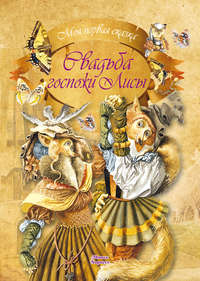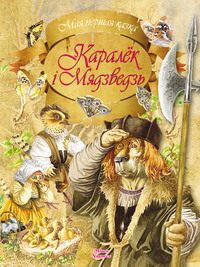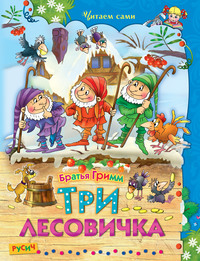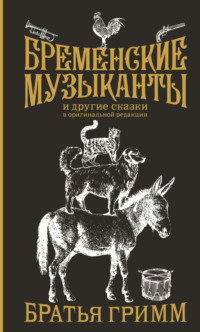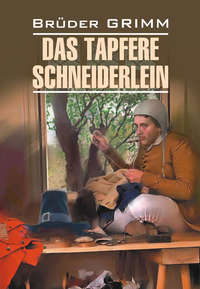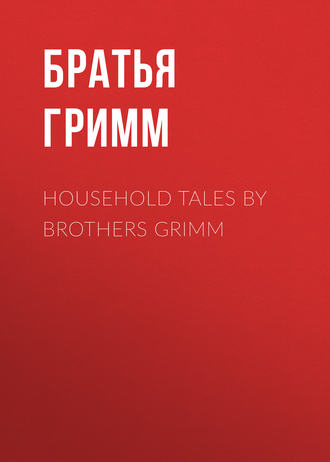 полная версия
полная версияHousehold Tales by Brothers Grimm
But fat Trina was no less idle. "Dear Harry," said she one day, "why should we make our lives so toilsome when there is no need for it, and thus ruin the best days of our youth? Would it not be better for us to give the two goats which disturb us every morning in our sweetest sleep with their bleating, to our neighbor, and he will give us a beehive for them. We will put the beehive in a sunny place behind the house, and trouble ourselves no more about it. Bees do not require to be taken care of, or driven into the field; they fly out and find the way home again for themselves, and collect honey without giving the very least trouble." "Thou hast spoken like a sensible woman," replied Harry. "We will carry out thy proposal without delay, and besides all that, honey tastes better and nourishes one better than goat's milk, and it can be kept longer too."
The neighbor willingly gave a beehive for the two goats. The bees flew in and out from early morning till late evening without ever tiring, and filled the hive with the most beautiful honey, so that in autumn Harry was able to take a whole pitcherful out of it.
They placed the jug on a board which was fixed to the wall of their bed-room, and as they were afraid that it might be stolen from them, or that the mice might find it, Trina brought in a stout hazel-stick and put it beside her bed, so that without unnecessary getting up she might reach it with her hand, and drive away the uninvited guests. Lazy Harry did not like to leave his bed before noon. "He who rises early," said he, "wastes his substance."
One morning when he was still lying amongst the feathers in broad daylight, resting after his long sleep, he said to his wife, "Women are fond of sweet things, and thou art always tasting the honey in private; it will be better for us to exchange it for a goose with a young gosling, before thou eatest up the whole of it." "But," answered Trina, "not before we have a child to take care of them! Am I to worry myself with the little geese, and spend all my strength on them to no purpose." "Dost thou think," said Harry, "that the youngster will look after geese? Now-a-days children no longer obey, they do according to their own fancy, because they consider themselves cleverer than their parents, just like that lad who was sent to seek the cow and chased three blackbirds." "Oh," replied Trina, "this one shall fare badly if he does not do what I say! I will take a stick and belabour his skin for him with more blows than I can count. Look, Harry," cried she in her zeal, and seized the stick which she had to drive the mice away with, "Look, this is the way I will fall on him!" She reached her arm out to strike, but unhappily hit the honey-pitcher above the bed. The pitcher struck against the wall and fell down in fragments, and the fine honey streamed down on the ground. "There lie the goose and the young gosling," said Harry, "and want no looking after. But it is lucky that the pitcher did not fall on my head. We have all reason to be satisfied with our lot." And then as he saw that there was still some honey in one of the fragments he stretched out his hand for it, and said quite gaily, "The remains, my wife, we will still eat with a relish, and we will rest a little after the fright we have had. What matters if we do get up a little later the day is always long enough." "Yes," answered Trina, "we shall always get to the end of it at the proper time. Dost thou know that the snail was once asked to a wedding and set out to go, but arrived at the christening. In front of the house it fell over the fence, and said, 'Speed does no good.'"
165 The Griffin
There was once upon a time a King, but where he reigned and what he was called, I do not know. He had no son, but an only daughter who had always been ill, and no doctor had been able to cure her. Then it was foretold to the King that his daughter should eat herself well with an apple. So he ordered it to be proclaimed throughout the whole of his kingdom, that whosoever brought his daughter an apple with which she could eat herself well, should have her to wife, and be King. This became known to a peasant who had three sons, and he said to the eldest, "Go out into the garden and take a basketful of those beautiful apples with the red cheeks and carry them to the court; perhaps the King's daughter will be able to eat herself well with them, and then thou wilt marry her and be King." The lad did so, and set out.
When he had gone a short way he met a little iron man who asked him what he had there in the basket, to which replied Uele, for so was he named, "Frogs' legs." On this the little man said, "Well, so shall it be, and remain," and went away. At length Uele arrived at the palace, and made it known that he had brought apples which would cure the King's daughter if she ate them. This delighted the King hugely, and he caused Uele to be brought before him; but, alas! when he opened the basket, instead of having apples in it he had frogs' legs which were still kicking about. On this the King grew angry, and had him driven out of the house. When he got home he told his father how it had fared with him. Then the father sent the next son, who was called Seame, but all went with him just as it had gone with Uele. He also met the little iron man, who asked what he had there in the basket. Seame said, "Hogs' bristles," and the iron man said, "well, so shall it be, and remain." When Seame got to the King's palace and said he brought apples with which the King's daughter might eat herself well, they did not want to let him go in, and said that one fellow had already been there, and had treated them as if they were fools. Seame, however, maintained that he certainly had the apples, and that they ought to let him go in. At length they believed him, and led him to the King. But when he uncovered the basket, he had but hogs' bristles. This enraged the King most terribly, so he caused Seame to be whipped out of the house. When he got home he related all that had befallen him, then the youngest boy, whose name was Hans, but who was always called Stupid Hans, came and asked his father if he might go with some apples. "Oh!" said the father, "thou wouldst be just the right fellow for such a thing! If the clever ones can't manage it, what canst thou do?" The boy, however, did not believe him, and said, "Indeed, father, I wish to go." "Just get away, thou stupid fellow, thou must wait till thou art wiser," said the father to that, and turned his back. Hans, however, pulled at the back of his smock-frock and said, "Indeed, father, I wish to go." "Well, then, so far as I am concerned thou mayst go, but thou wilt soon come home again!" replied the old man in a spiteful voice. The boy, however, was tremendously delighted and jumped for joy. "Well, act like a fool! thou growest more stupid every day!" said the father again. Hans, however, did not care about that, and did not let it spoil his pleasure, but as it was then night, he thought he might as well wait until the morrow, for he could not get to court that day. All night long he could not sleep in his bed, and if he did doze for a moment, he dreamt of beautiful maidens, of palaces, of gold, and of silver, and all kinds of things of that sort. Early in the morning, he went forth on his way, and directly afterwards the little shabby-looking man in his iron clothes, came to him and asked what he was carrying in the basket. Hans gave him the answer that he was carrying apples with which the King's daughter was to eat herself well. "Then," said the little man, "so shall they be, and remain." But at the court they would none of them let Hans go in, for they said two had already been there who had told them that they were bringing apples, and one of them had frogs' legs, and the other hogs' bristles. Hans, however, resolutely maintained that he most certainly had no frogs' legs, but some of the most beautiful apples in the whole kingdom. As he spoke so pleasantly, the door-keeper thought he could not be telling a lie, and asked him to go in, and he was right, for when Hans uncovered his basket in the King's presence, golden-yellow apples came tumbling out. The King was delighted, and caused some of them to be taken to his daughter, and then waited in anxious expectation until news should be brought to him of the effect they had. But before much time had passed by, news was brought to him: but who do you think it was who came? it was his daughter herself! As soon as she had eaten of those apples, she was cured, and sprang out of her bed. The joy the King felt cannot be described! but now he did not want to give his daughter in marriage to Hans, and said he must first make him a boat which would go quicker on dry land than on water. Hans agreed to the conditions, and went home, and related how it had fared with him. Then the father sent Uele into the forest to make a boat of that kind. He worked diligently, and whistled all the time. At mid-day, when the sun was at the highest, came the little iron man and asked what he was making? Uele gave him for answer, "Wooden bowls for the kitchen." The iron man said, "So it shall be, and remain." By evening Uele thought he had now made the boat, but when he wanted to get into it, he had nothing but wooden bowls. The next day Seame went into the forest, but everything went with him just as it had done with Uele. On the third day Stupid Hans went. He worked away most industriously, so that the whole forest resounded with the heavy strokes, and all the while he sang and whistled right merrily. At mid-day, when it was the hottest, the little man came again, and asked what he was making? "A boat which will go quicker on dry land than on the water," replied Hans, "and when I have finished it, I am to have the King's daughter for my wife." "Well," said the little man, "such an one shall it be, and remain." In the evening, when the sun had turned into gold, Hans finished his boat, and all that was wanted for it. He got into it and rowed to the palace. The boat went as swiftly as the wind. The King saw it from afar, but would not give his daughter to Hans yet, and said he must first take a hundred hares out to pasture from early morning until late evening, and if one of them got away, he should not have his daughter. Hans was contented with this, and the next day went with his flock to the pasture, and took great care that none of them ran away.
Before many hours had passed came a servant from the palace, and told Hans that he must give her a hare instantly, for some visitors had come unexpectedly. Hans, however, was very well aware what that meant, and said he would not give her one; the King might set some hare soup before his guest next day. The maid, however, would not believe in his refusal, and at last she began to get angry with him. Then Hans said that if the King's daughter came herself, he would give her a hare. The maid told this in the palace, and the daughter did go herself. In the meantime, however, the little man came again to Hans, and asked him what he was doing there? He said he had to watch over a hundred hares and see that none of them ran away, and then he might marry the King's daughter and be King. "Good," said the little man, "there is a whistle for thee, and if one of them runs away, just whistle with it, and then it will come back again." When the King's daughter came, Hans gave her a hare into her apron; but when she had gone about a hundred steps with it, he whistled, and the hare jumped out of the apron, and before she could turn round was back to the flock again. When the evening came the hare-herd whistled once more, and looked to see if all were there, and then drove them to the palace. The King wondered how Hans had been able to take a hundred hares to graze without losing any of them; he would, however, not give him his daughter yet, and said he must now bring him a feather from the Griffin's tail. Hans set out at once, and walked straight forwards. In the evening he came to a castle, and there he asked for a night's lodging, for at that time there were no inns. The lord of the castle promised him that with much pleasure, and asked where he was going? Hans answered, "To the Griffin." "Oh! to the Griffin! They tell me he knows everything, and I have lost the key of an iron money-chest; so you might be so good as to ask him where it is." "Yes, indeed," said Hans, "I will do that." Early the next morning he went onwards, and on his way arrived at another castle in which he again stayed the night. When the people who lived there learnt that he was going to the Griffin, they said they had in the house a daughter who was ill, and that they had already tried every means to cure her, but none of them had done her any good, and he might be so kind as to ask the Griffin what would make their daughter healthy again? Hans said he would willingly do that, and went onwards. Then he came to a lake, and instead of a ferry-boat, a tall, tall man was there who had to carry everybody across. The man asked Hans whither he was journeying? "To the Griffin," said Hans. "Then when you get to him," said the man, "just ask him why I am forced to carry everybody over the lake." "Yes, indeed, most certainly I'll do that," said Hans. Then the man took him up on his shoulders, and carried him across. At length Hans arrived at the Griffin's house, but the wife only was at home, and not the Griffin himself. Then the woman asked him what he wanted? Thereupon he told her everything; – that he had to get a feather out of the Griffin's tail, and that there was a castle where they had lost the key of their money-chest, and he was to ask the Griffin where it was? – that in another castle the daughter was ill, and he was to learn what would cure her? – and then not far from thence there was a lake and a man beside it, who was forced to carry people across it, and he was very anxious to learn why the man was obliged to do it. Then said the woman, "But look here, my good friend, no Christian can speak to the Griffin; he devours them all; but if you like, you can lie down under his bed, and in the night, when he is quite fast asleep, you can reach out and pull a feather out of his tail, and as for those things which you are to learn, I will ask about them myself." Hans was quite satisfied with this, and got under the bed. In the evening, the Griffin came home, and as soon as he entered the room, said, "Wife, I smell a Christian." "Yes," said the woman, "one was here to-day, but he went away again;" and on that the Griffin said no more.
In the middle of the night when the Griffin was snoring loudly, Hans reached out and plucked a feather from his tail. The Griffin woke up instantly, and said, "Wife, I smell a Christian, and it seems to me that somebody was pulling at my tail." His wife said, "Thou hast certainly been dreaming, and I told thee before that a Christian was here to-day, but that he went away again. He told me all kinds of things that in one castle they had lost the key of their money-chest, and could find it nowhere." "Oh! the fools!" said the Griffin; "the key lies in the wood- house under a log of wood behind the door." "And then he said that in another castle the daughter was ill, and they knew no remedy that would cure her." "Oh! the fools!" said the Griffin; "under the cellar-steps a toad has made its nest of her hair, and if she got her hair back she would be well." "And then he also said that there was a place where there was a lake and a man beside it who was forced to carry everybody across." "Oh, the fool!" said the Griffin; "if he only put one man down in the middle, he would never have to carry another across." Early the next morning the Griffin got up and went out. Then Hans came forth from under the bed, and he had a beautiful feather, and had heard what the Griffin had said about the key, and the daughter, and the ferry-man. The Griffin's wife repeated it all once more to him that he might not forget it, and then he went home again. First he came to the man by the lake, who asked him what the Griffin had said, but Hans replied that he must first carry him across, and then he would tell him. So the man carried him across, and when he was over Hans told him that all he had to do was to set one person down in the middle of the lake, and then he would never have to carry over any more. The man was hugely delighted, and told Hans that out of gratitude he would take him once more across, and back again. But Hans said no, he would save him the trouble, he was quite satisfied already, and pursued his way. Then he came to the castle where the daughter was ill; he took her on his shoulders, for she could not walk, and carried her down the cellar-steps and pulled out the toad's nest from beneath the lowest step and gave it into her hand, and she sprang off his shoulder and up the steps before him, and was quite cured. Then were the father and mother beyond measure rejoiced, and they gave Hans gifts of gold and of silver, and whatsoever else he wished for, that they gave him. And when he got to the other castle he went at once into the wood-house, and found the key under the log of wood behind the door, and took it to the lord of the castle. He also was not a little pleased, and gave Hans as a reward much of the gold that was in the chest, and all kinds of things besides, such as cows, and sheep, and goats. When Hans arrived before the King, with all these things – with the money, and the gold, and the silver and the cows, sheep and goats, the King asked him how he had come by them. Then Hans told him that the Griffin gave every one whatsoever he wanted. So the King thought he himself could make such things useful, and set out on his way to the Griffin; but when he got to the lake, it happened that he was the very first who arrived there after Hans, and the man put him down in the middle of it and went away, and the King was drowned. Hans, however, married the daughter, and became King.
166 Strong Hans
There were once a man and a woman who had an only child, and lived quite alone in a solitary valley. It came to pass that the mother once went into the wood to gather branches of fir, and took with her little Hans, who was just two years old. As it was spring-time, and the child took pleasure in the many-coloured flowers, she went still further onwards with him into the forest. Suddenly two robbers sprang out of the thicket, seized the mother and child, and carried them far away into the black forest, where no one ever came from one year's end to another. The poor woman urgently begged the robbers to set her and her child free, but their hearts were made of stone, they would not listen to her prayers and entreaties, and drove her on farther by force. After they had worked their way through bushes and briars for about two miles, they came to a rock where there was a door, at which the robbers knocked and it opened at once. They had to go through a long dark passage, and at last came into a great cavern, which was lighted by a fire which burnt on the hearth. On the wall hung swords, sabres, and other deadly weapons which gleamed in the light, and in the midst stood a black table at which four other robbers were sitting gambling, and the captain sat at the head of it. As soon as he saw the woman he came and spoke to her, and told her to be at ease and have no fear, they would do nothing to hurt her, but she must look after the house-keeping, and if she kept everything in order, she should not fare ill with them. Thereupon they gave her something to eat, and showed her a bed where she might sleep with her child.
The woman stayed many years with the robbers, and Hans grew tall and strong. His mother told him stories, and taught him to read an old book of tales about knights which she found in the cave. When Hans was nine years old, he made himself a strong club out of a branch of fir, hid it behind the bed, and then went to his mother and said, "Dear mother, pray tell me who is my father; I must and will know." His mother was silent and would not tell him, that he might not become home-sick; moreover she knew that the godless robbers would not let him go away, but it almost broke her heart that Hans should not go to his father. In the night, when the robbers came home from their robbing expedition, Hans brought out his club, stood before the captain, and said, "I now wish to know who is my father, and if thou dost not at once tell me I will strike thee down." Then the captain laughed, and gave Hans such a box on the ear that he rolled under the table. Hans got up again, held his tongue, and thought, "I will wait another year and then try again, perhaps I shall do better then." When the year was over, he brought out his club again, rubbed the dust off it, looked at it well, and said, "It is a stout strong club." At night the robbers came home, drank one jug of wine after another, and their heads began to be heavy. Then Hans brought out his club, placed himself before the captain, and asked him who was his father? But the captain again gave him such a vigorous box on the ear that Hans rolled under the table, but it was not long before he was up again, and beat the captain and the robbers so with his club, that they could no longer move either their arms or their legs. His mother stood in a corner full of admiration of his bravery and strength. When Hans had done his work, he went to his mother, and said, "Now I have shown myself to be in earnest, but now I must also know who is my father." "Dear Hans," answered the mother, "come, we will go and seek him until we find him." She took from the captain the key to the entrance-door, and Hans fetched a great meal-sack and packed into it gold and silver, and whatsoever else he could find that was beautiful, until it was full, and then he took it on his back. They left the cave, but how Hans did open his eyes when he came out of the darkness into daylight, and saw the green forest, and the flowers, and the birds, and the morning sun in the sky. He stood there and wondered at everything just as if he had not been very wise. His mother looked for the way home, and when they had walked for a couple of hours, they got safely into their lonely valley and to their little house. The father was sitting in the doorway. He wept for joy when he recognized his wife and heard that Hans was his son, for he had long regarded them both as dead. But Hans, although he was not twelve years old, was a head taller than his father. They went into the little room together, but Hans had scarcely put his sack on the bench by the stove, than the whole house began to crack the bench broke down and then the floor, and the heavy sack fell through into the cellar. "God save us!" cried the father, "what's that? Now thou hast broken our little house to pieces!" "Don't grow any grey hairs about that, dear father," answered Hans; "there, in that sack, is more than is wanting for a new house." The father and Hans at once began to build a new house; to buy cattle and land, and to keep a farm. Hans ploughed the fields, and when he followed the plough and pushed it into the ground, the bullocks had scarcely any need to draw. The next spring, Hans said, "Keep all the money and get a walking-stick that weighs a hundred-weight made for me that I may go a-travelling." When the wished-for stick was ready, he left his father's house, went forth, and came to a deep, dark forest. There he heard something crunching and cracking, looked round, and saw a fir-tree which was wound round like a rope from the bottom to the top, and when he looked upwards he saw a great fellow who had laid hold of the tree and was twisting it like a willow-wand. "Hollo!" cried Hans, "what art thou doing up there?" the fellow replied, "I got some faggots together yesterday and am twisting a rope for them." "That is what I like," thought Hans, "he has some strength," and he called to him, "Leave that alone, and come with me." The fellow came down, and he was taller by a whole head than Hans, and Hans was not little. "Thy name is now Fir-twister," said Hans to him. Thereupon they went further and heard something knocking and hammering with such force that the ground shook at every stroke. Shortly afterwards they came to a mighty rock, before which a giant was standing and striking great pieces of it away with his fist. When Hans asked what he was about, he answered, "At night, when I want to sleep, bears, wolves, and other vermin of that kind come, which sniff and snuffle about me and won't let me rest; so I want to build myself a house and lay myself inside it, so that I may have some peace." "Oh, indeed," thought Hans, "I can make use of this one also;" and said to him, "Leave thy house-building alone, and go with me; thou shalt be called Rock-splitter." The man consented, and they all three roamed through the forest, and wherever they went the wild beasts were terrified, and ran away from them. In the evening they came to an old deserted castle, went up into it, and laid themselves down in the hall to sleep. The next morning Hans went into the garden. It had run quite wild, and was full of thorns and bushes. And as he was thus walking round about, a wild boar rushed at him; he, however, gave it such a blow with his club that it fell directly. He took it on his shoulders and carried it in, and they put it on a spit, roasted it, and enjoyed themselves. Then they arranged that each day, in turn, two should go out hunting, and one should stay at home, and cook nine pounds of meat for each of them. Fir-twister stayed at home the first, and Hans and Rock-splitter went out hunting. When Fir-twister was busy cooking, a little shrivelled-up old mannikin came to him in the castle, and asked for some meat. "Be off, sly hypocrite," he answered, "thou needest no meat." But how astonished Fir-twister was when the little insignificant dwarf sprang up at him, and belaboured him so with his fists that he could not defend himself, but fell on the ground and gasped for breath! The dwarf did not go away until he had thoroughly vented his anger on him. When the two others came home from hunting, Fir-twister said nothing to them of the old mannikin and of the blows which he himself had received, and thought, "When they stay at home, they may just try their chance with the little scrubbing-brush;" and the mere thought of that gave him pleasure already.


